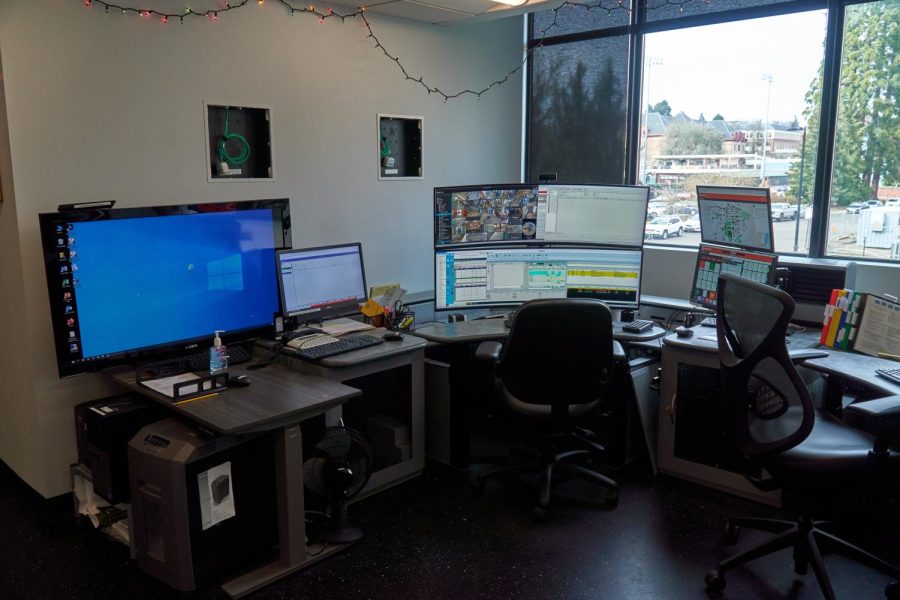Campus dispatch center upgrades equipment due to higher demand
Radios flicker on and off while computer monitors map alarms around campus at the new OSU Public Safety Dispatch Center inside Cascade Hall on February 12, 2023. The new center allows Public Safety to handle student and resident calls around campus more efficient.
February 28, 2023
Oregon State University’s dispatch center used to reside in a tiny room in the public safety center on campus, according to Dispatch Center Teresa Parker.
“It kind of looked like a broom closet,” Parker said.
Parker recalled that three dispatch stations used to be tightly arranged together inside the room. Outdated equipment, such as a dry erase board to keep track of alarms that were out of service, was used.
With more demand from OSU’s addition of a police department and the need for more space, staffing and technology, the dispatch center received improvements totaling approximately $375,000.
This police department was formed in 2021, increasing the call volume and activity that the dispatch center would need to manage.
Construction started in February and ended in October of the same year. A few shipments of equipment — delayed by the pandemic — are still awaiting arrival.
According to Parker, walls were broken down so more space could be integrated into the dispatch center. Two additional stations were added, going from three to five stations. More computer screens were added to handle more information, desk phones were replaced with headsets and a computer-aided dispatch system was installed.
“We now have the capability of communicating with other agencies who may respond to campus to assist us with large events or in times of significant emergencies,” said Shanon Anderson, associate vice president for public safety and chief of police.
In addition to software upgrades and adding more space, sturdier ergonomic chairs were added.
“We’re also concerned about employee health, and ensuring that we have ergonomic options available. As being a dispatcher, you’re very sedentary; you sit all day long and so some of those things we have are directly related to help improve employee health,” Parker said.
Alternatives for improving the dispatch center included having the city of Corvallis, Linn County or Albany dispatch for OSU. However, it was more cost-effective to improve OSU’s dispatch center.
According to Parker, having another entity such as the City of Corvallis dispatch the OSU police would result in longer wait times because they receive more calls of higher priority.
“We have the luxury with our own dispatch center to dispatch our police in a timely fashion,” Parker said.
Now, the dispatch center has more space for handling the additional equipment and staffing needed for special events and increased call volume, according to Parker and Anderson.
With the future in mind, these improvements will also make the dispatch center more flexible for future changes in technology and radio systems, according to Anderson.
“Each decision we made during the dispatch upgrade took into consideration the current impacts, as well as the future impacts,” Anderson said.
For Parker, the upgrades to the dispatch room have been satisfactory.
“It’s amazing. It’s spacious. It’s got better lighting. It’s just a better environment for the increased staff. It looks nicer. We’re prideful to have people come through and take a look and see what we do,” Parker said.
According to Parker, working at the dispatch center also means being committed to giving the best service and resources to the community. For twelve-hour shifts, dispatchers monitor campus alarms and police radio, accept calls and go to work on both holidays and in bad weather.
According to Anderson, in addition to monitoring campus alarms, the dispatch center monitors vital research alarms to help the university meet its mission as a land grant university.
Last year, OSU’s dispatchers received almost 5,000 calls for service and self-initiated activity from public safety officers, 424 calls for found property, 310 calls for lost property and 338 calls for elevator malfunctions, among others.
Dispatchers and Public Safety are responsible for helping students jumpstart or unlock their vehicles, escorting people to their vehicles if they feel unsafe, helping officers apprehend people who have committed crimes such as bicycle theft and motor vehicle crashes and more.
“‘We have an investment’ is a good way to put it,” Parker said. “We are invested in providing services to our community.”











































































































